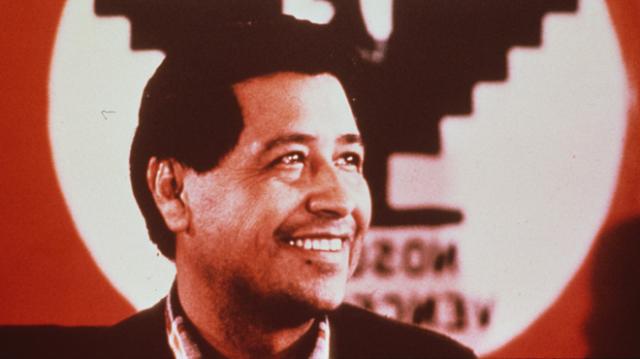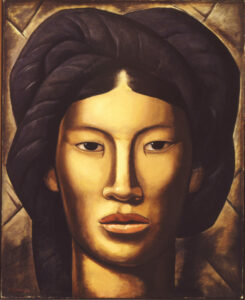Cesar Chavez is a very famous Mexican-American labor leader. He inspired many agricultural workers to stand up and face problems in the work force. Chavez led a series of peaceful protests and strikes to help migrant workers get higher pay, and started a labor movement. The actions that Cesar Chavez took called for national attention. With his relentless attitude, he led many Mexican-Americans to speak up, and to stand up for themselves and the rights that they deserved.
Cesar Chavez was born on March 31, 1927 in North Gila Valley, Arizona. At the age of 10, Chavez’s family had lost their family farm and small grocery store due to the chaos of the Great Depression. Without their farm and family-owned grocery store Chavez’s family had no financial income and were forced to join the migrant farm workers.1 When Cesar was fourteen, his father was in an automobile accident that impeded him from working, so Cesar Chavez felt the need to help his family by working in the fields and postponing his high school education for two years.2 Of course the two years became long forgotten because by the age of 17 Cesar Chavez had enlisted in the U.S. Navy. Chavez served in the Navy for two years before being discharged. Chávez described these two years as the worst years of his life.

Neither his mother nor his father wanted him to enlist in the Navy, but he knew he either had to enlist or get drafted. Instead of being drafted into the Army, he enlisted in the U.S. Navy. His work in the Navy consisted of being a deck hand and crew transport. Chavez was never engaged in combat throughout his two years of service. In a seventy-two-hour pass that Chavez and his navy friends received, they returned to Texas and attended a movie theater. Movie theaters were segregated at that time and “it was just accepted by the Mexicans” that they were to sit “in the quarter-section on the right [of the theater].”3 Chavez felt that he should not have to accept such discrimination, so he sat on the left of the theater. A scandal erupted. Chavez was asked to move back to the right of the theater and when he refused, he was sent to jail. Chavez recalls that the sergeant did not know what to charge him with and started to make phone calls to help him figure out what charges to put on Chavez. Chavez could hear the conversations about charging him with “disturbing the peace” and “being drunk.” After about an hour of deliberation with judges, chief of police, and his fellow police officers, the sergeant lectured Chavez and let him go, but not before threatening to put him in jail for life. This was the first time that Chavez had challenged rules discriminating against him due to his race, but it surely would not be the last.4
When his two years of service up, Chavez returned to work in the fields once again and in 1948 he married Helen Fabela.5 It was shortly after this that Cesar created his credit union with Dolores Huerta, a fellow worker at the Community Service Organization (CSO) that continuously encouraged him to organize farmworkers in order to help them. They would loan money out and help people of all ethnicities.

Since hundreds of people would show up to Chavez’s house because of his credit union, many of the anglos in the area started accusing them, Huerta and Chavez, of being communists, trying to bring an end to the union. Policemen would come in and try to disperse those attending, but Chavez knew the law and knew that they would not be able to put the union down.6 Cesar Chavez and all of those associated with him began being called communists. It was all over the newspapers, and back then the newspaper had a lot of influence on the community. Because of this label, people began disassociating themselves with Chavez due to fear.7
About three years after the start of the credit union, Chavez began his famous strikes, boycotts, and his 25 day fast. Chavez knew he was in for a long ride when he decided to start helping his fellow farm workers. There would be many moments of despair and even more times of joy and excitement.
- Salem Press Biographical Encyclopedia, s.v. “César Chávez,” by Cecilia M. Garcia. ↵
- Jacques E. Levy and Cesar Chavez, Cesar Chavez : Autobiography of La Causa (New York : Norton, 1975.), 73. ↵
- Levy and Chavez, Cesar Chavez : Autobiography of La Causa, 84-85. ↵
- Levy and Chavez, Cesar Chavez : Autobiography of La Causa, 84-85. ↵
- Salem Press Biographical Encyclopedia, s.v.“César Chávez,” by Cecilia M. Garcia. ↵
- Cesar Chavez, directed by Diego Luna (Santa Monica, CA : Lionsgate, 2014), DVD. ↵
- Levy and Chavez, Cesar Chavez : Autobiography of La Causa, 107. ↵



48 comments
Thomas Fraire
When I was younger my dad worked at a high school called Cesar Chavez , so thats why i chicken on this. But as a Hispanic I really have to respect the things he did for my people. I mean a 25 day hunger strike people could die from stuff like that but he was fighting for equality because God created us all equal and its inspiring to see the lengths people went to get equality. I mean everyone know MLK but Cesar Chavez is someone that specify fought for me and my people so its more personal.
Alyssa Vela
Since I was younger I’ve always thought that Cesar Chaves was such an interesting person. Growing up, I wasn’t personally taught about him, but I’ve heard stories and from those stories, can see him as a very influential person, a hero even. I couldn’t imagine how he felt, and commend him for leading the way he did for what he believed in. Overall a greatly written article. I look forward to reading more of your work!
Alexis Soto
Since I was a small child I knew who Cesar Chavez was. He was like a legend or hero. I can recall a middle school event where I got to meet his grandson who was giving a speech about his grandfather, Cesar Chavez, and spoke of how humble he was. This article was great! It really was a good read. Straight to the point.
Cesar Zavala
The movie theater incident that Cesar Chavez experienced is so outrages to think about. Cesar Chavez did not even try to sit in the middle of the theater, the best place to watch a movie in my opinion, instead he only switched to the opposite side but was still asked to move. It’s hard to believe that people used to be this aggressive towards minorities and it is even harder to think that incidents like this still occur to this day. Great article!
Sam Vandenbrink
Ceaser Chavez is a very inspirational man, standing up for what he believes in and not letting anyone else tell him how to live his life. He lead a culture and influenced many children in a positive way I thought this was really inspirational. Enlisting into the U.S Navy was also a really smart move on his part other then being drafted into the army. Great article learned allot about Ceaser Chavez I wouldn’t have thought about him.
Andrew Gray
Very interesting article! I honestly didn’t know anything about the early life of Cesar Chaves. Cesar was one of the major contributors that helped kick start the civil rights movement in the United States. This is a very inspiring article and considering our current political situation the Mexican-American civil rights movement is as alive today as it has ever been!
Marissa Gonzalez
I have heard about Cesar Chavez and I had watched a film about him; however, I was not familiar with the movie theater scene where he sat on the left side of the theater. I did not realize there was discrimination like that during that time to the point where he was able to get arrested for it. It is inspiring how he was able to become determined and not get discouraged even though people were disassociating themselves from him during his movement. This article was very informative on his background and how his foundation inspired him to stand up and make a difference for Latin Americans.
Alyssa Valdez
Great Article! I was so fortunate to receive Cesar Chavez’s scholarship and I am honestly so grateful for it because it helped out so much. It’s so amazing to learn more about him and what he believed in. I think it is even better that when other tried to push down on his beliefs he did not back down but instead stood up for what he believed in. Truly an inspiration.
Lianna Ybarra
Great article, but I think it could have elaborated more on a few of the protests he did and why he did them. I thought it had great background information and definitely showed that he was strong willed. I think it’s great that he took a stance for hispanics/Mexican Americans because I think we forget that there was discrimination for all minorities. Growing up in San Antonio, Cesar Chavez is widely known, there was even a street named after him here downtown. That just goes to show what great an impact he made.
Luke Trevino
Amazing! Cesar Chavez really changed the course in the work force. His work influenced many to stand up for what is right. His story of his life is not just one about the work force changing but a good story of never giving up in what you believe. Overall, he is inspiring for all Hispanics struggling, because of his work many Hispanics have been able to stand up for themselves.